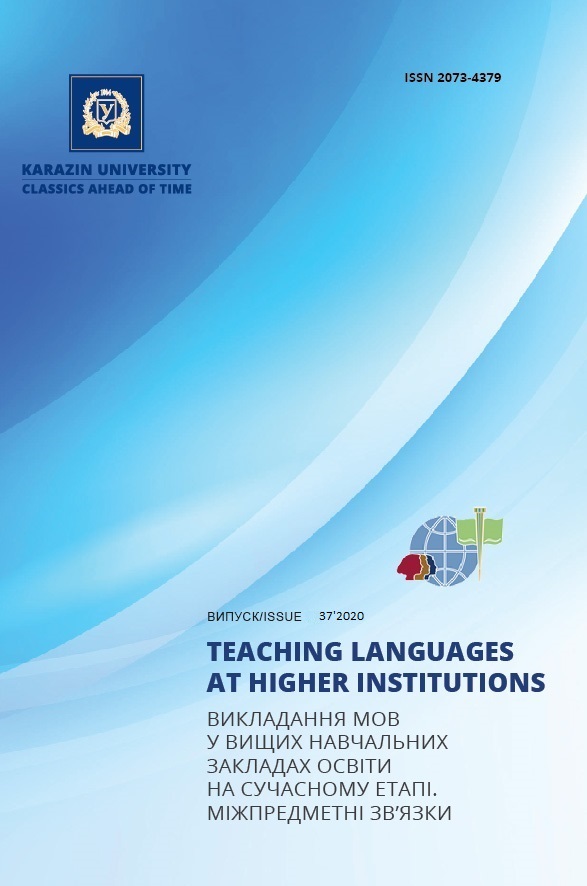Testing as a form of quality control of students’ knowledge in German language classes
Abstract
The issue of modern pedagogical diagnostics of the results of students’ educational activity is becoming more and more relevant in terms of further improvement of the educational process in higher school. The article aims to substantiate the theoretical foundations of the effectiveness of testing and to demonstrate specific examples of various types of tests for quality control of students’ knowledge acquisition in German language classes.The article emphasizes that control in various forms allows identifying a level of mastering a material according to the curriculum and mastering the relevant practical skills and abilities of students and to determine shortcomings and complexities of the learning process. It has been found that tests are the most modern and the most common form of testing the acquisition of educational material in the teaching of a foreign language. The paper also analyzes the advantages and disadvantages of using test control. The use of different types of testing in the process of the German language acquisition allows the teacher to find out the degree of understanding and assimilation of educational material in students, to determine the effectiveness of teaching methods and adjust them. It is revealed that through tests it is possible to carry out all types of control: input, current, boundary, control of residual knowledge, final. The paper outlines different types of tests and formulates the purpose of their application, i.e. feasibility of using a task in determining a level of formation of different linguistic competences in accordance with the German language curriculum. The article presents specific examples, which are posted on the site of distance learning of the National Aerospace University “Kharkiv Aviation Institute”, including various types of questions: multiple-choice tests, tests to establish compliance, tests to determine the truth or falsity of statements, as well as open-ended tasks. The author emphasizes that tests will be the most effective in combination with other types of control.In conclusion, the use of testing as a form of control allows the teacher organize the process of monitoring student performance effectively, provides maximum objectivity of assessment, reduces processing time, allows statistical processing of material and, thus, improves the quality of control and assimilation of educational material for the German language acquisition.
Downloads
References
Budanova, L.G. (2007). Vykorystannya testovih zavdan u procesі vyvchennya іnozemnih mov [Use of test tasks in the process of learning foreign languages]. Visnyk Kharkivskoi Derzhavnoi Akademii Dyzainu i Mystetstv. Mystetstvoznavstvo. Arkhytektura [Bulletin of the Kharkiv State Academy of Design and Arts. Art history. Architecture]. Kharkiv, 5, pp. 11–14 [in Ukrainian].
Gnyedkova, O.O. (2016). Distancіynі tehnologіyi navchannya u organіzacіyi kontrolyu znan samostіynoyi roboty studentіv movnyh specіalnostey VNZ [Distance learning technologies in the organization of knowledge control of independent work of higher school linguistic students]. SWorld International periodic scientific journal. Ivanovo: Vidavnictvo OOO “Nauchnyj mir”, 2 (43), pp. 88–95 [in Ukrainian].
Daragan, T., Timoshenko, N. and Vlasjuk, O. (2017). Vykoristannja іnformacіjno-komunіkacіjnyh tehnologіj u vyikladackіj dіjalnostі [The use of information and communication technologies in teaching]. Vishha shkola [High school]. Kyiv: Znannya, 12 (161), pp. 65–70 [in Ukrainian].
Kremen, V.G. (Ed.). (2008). Enciklopedіya osvіty [Encyclopedia of Education]. Kyiv: Yurinkom Inter [in Ukrainian].
Klymenko, L.O. (2013). Zovnіshnye testuvannja navchalnyh dosyagnen uchnіv [External testing of students’ academic achievements]. Kyiv: Pleyada [in Ukrainian].
Sayt distancіynogo navchannya Nacіonalnogo aerokosmіchnogo unіversitetu “HAІ” [Site for the distance learning of the National Aerospace University “KhAI”]. mentor.khai.edu [online]. Available at: https://mentor.khai.edu/course/view.php?id=1884 [Accessed 14 Aug. 2020] [in Ukrainian].
Filatov, V.M. (2004). Metodika obuchenija inostrannym jazykam v nachalnoj i obshheobrazovatelnoj shkole [Methods of teaching foreign languages in primary and secondary schools]. Rostov: Informacionno-izdatelskij dom “Filing” [in Russian].
Ficula, M.M. (2006). Pedagogіka vishhoyi shkoly [Pedagogy of higher school]. Kyiv: Akademvydav [in Ukrainian].
Folomkina, S.K. (1986). Testirovanie pri izuchenii inostrannogo jazyka [Testing while learning a foreign language]. Inostrannye jazyki v shkole [Foreign languages at school]. Moscow: Prosveshhenie, 2, pp. 16–20 [in Russian].
Holmberg, B. (2011). The evolution, principles and practices of distance education. Oldenburg: Bibliotheks-und Informationssystem der Universität Oldenburg [in English].

